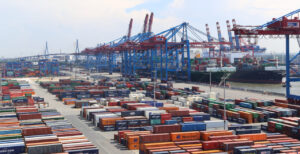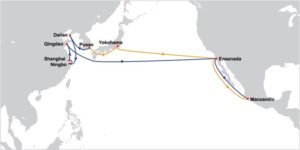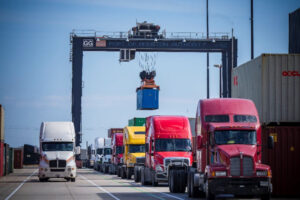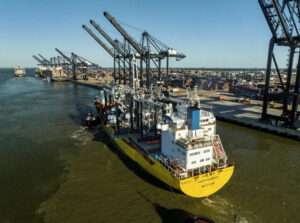Welcome to PTI’s year in review for 2023.
Looking back at the maritime and port activities of the past year, sustainability became a key focus, gaining significant attention throughout the industry. The emphasis on more environmentally friendly supply chains resulted in noticeable changes, such as the increase in electric vehicles and the exploration of eco-friendly fuels in shipping.
In the technology realm, the sector dealt with incorporating AI for improved operations while tackling cybersecurity hurdles. Instances like the breach at the Port of Lisbon and cyber attacks on Canadian ports and DP World Australia highlighted the crucial necessity for robust cybersecurity measures to ensure safety. Despite these obstacles, the commitment to embracing digital advancements remains unwavering, driven by the aim of streamlining and enhancing trade operations.
Our Top Reads in 2023
Some general major developments in ports and shipping from the past 12 months:
- ILWU contract promises 32 per cent pay rise and $70 million pandemic bonus
- Fire at Turkey’s Iskenderun port halts operations
- Cyber attack threatens release of Port of Lisbon data
- CMA CGM vessel installs first ever bow windshield
- Maersk, MSC end 2M alliance
- India-Middle East-Europe trade route launched at G20 Summit
- Shipping company fined $380,000 for health and safety breaches
- Largest drug bust sees 18,000 pounds of cocaine seized in the Netherlands
- Maritime cyber attacks database launches
Sustainability
Significant strides were made on the sustainability front this year, notably with the adoption of the 2023 IMO Strategy by the International Maritime Organization (IMO) at the Marine Environment Protection Committee (MEPC 80), aimed at reducing greenhouse gas (GHG) emissions from ships.
As the industry gears up for a green transformation, notable initiatives include the Ports of Los Angeles, Long Beach, and Shanghai outlining a Green Shipping Corridor Implementation Plan to expedite emissions reductions across the Pacific Ocean.
Additionally, Hapag-Lloyd has taken a step towards sustainability by entering a Conversion Commitment Agreement with MAN Energy Solutions and Seaspan Corporation, committing to equip its fleet with engine retrofit kits for methanol propulsion.
READ: Maersk develops methanol conversion project with Alfa Laval’s FCM System
In another noteworthy development, Hutchison Ports’ Hongkong International Terminals (HIT) invested HK$78 million ($9.9 million) in two innovative solar panel quay cranes, marking a significant move for Hong Kong.
Lastly, Rotterdam witnessed a pivotal moment with the adoption of electric vehicles. Kramer Group, StreetDrone, and Terberg collaborated to deploy autonomous yard trucks at multiple locations in the Port of Rotterdam, signalling a transformative shift in the use of electric equipment.
Digitalisation
In the realm of digitalisation, significant strides were made to employ smart technology, enhancing operations in ports and terminals and bolstering resilience in the supply chain.
For instance, shipping giant Maersk implemented AI-enabled robotics in its UK warehouse in East Midlands, elevating fulfilment service competitiveness and strengthening client supply chains.
Meanwhile, DP World’s subsidiary, Community Network Services (CNS), launched the CNS Port Community System (PCS), underlining a commitment to global technological advancement.
On the other hand, PSA Singapore introduced OptETruck, a cloud-based transport management system utilising AI to facilitate smarter trip planning and eliminate operational inefficiencies for the haulier community in Singapore.
Lastly, Nokia made headlines by deploying a private 4.9G/LTE wireless network for Husky Terminal in Tacoma, Washington. The private network was established to enable Husky Terminal’s upgrading to a cloud-based terminal operating system (TOS), allowing the corporation to control and coordinate terminal operations from anywhere.
2024 Outlook
Entering 2024, the supply chain encounters various pressures, including persistent and evolving risks in major trade routes – challenges such as limitations in the Panama Canal and concerns over geopolitical threats present potential hazards.
The delicate nature of current supply chains amplifies the need for resiliency in the next year.
PTI wishes you a pleasant winter break and looks forward to seeing you again in 2024!









